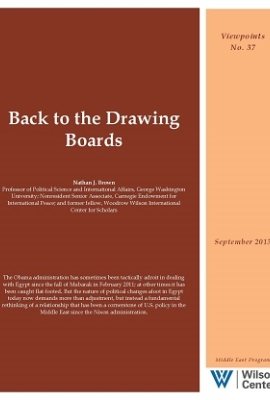Nathan J Brown
Former Fellow
Professional Affiliation
Professor of Political Science and International Affairs, George Washington University
Nonresident Senior Fellow, Carnegie Endowment for International Peace
Expert Bio
Nathan J. Brown, a professor of political science and international affairs at George Washington University, is a distinguished scholar and author of six well-received books on Arab politics. Brown brings his special expertise on Islamist movements, Egyptian politics, Palestinian politics, and Arab law and constitutionalism to Carnegie. Brown’s latest book, Arguing Islam After the Revival of Arab Politics, was published by Oxford University Press in 2016, and his previous book, When Victory Is Not an Option: Islamist Movements in Arab Politics, was published by Cornell University Press in early 2012. His current work focuses on religion, law, and politics in the Arab world.
In 2013, Brown was named a Guggenheim Fellow; four years earlier, he was named a Carnegie scholar by the Carnegie Corporation of New York. For the 2009–2010 academic year, he was a fellow at the Woodrow Wilson International Center for Scholars. In addition to his academic work, Brown serves on the board of trustees at the American University in Cairo. He has previously served as an advisor for the committee drafting the Palestinian constitution, USAID, the United Nations Development Program, and several NGOs. For 2013-2015 he is president of the Middle East Studies Association, the academic association for scholars studying the region.
Brown is the author of Between Religion and Politics (with Amr Hamzawy, Carnegie 2010); Resuming Arab Palestine (University of California Press, 2003); Constitutions in a Non-Constitutional World: Arab Basic Laws and Prospects for Accountable Government (SUNY Press, 2001); and The Rule of Law in the Arab World: Courts in Egypt and the Arab States of the Gulf (Cambridge University Press, 1997). He also edited The Dynamics of Democratization (Johns Hopkins University Press, 2012).
Wilson Center Project
"Islamist Movements in the Political Process: Ideology, Organization and Semiauthoritarianism"
Project Summary
Why do Islamist social movements in the Arab world form political parties and what do they hope to achieve from them? When do they eschew or de-emphasize politics in favor of other activities? Much of the recent work on Islamist politics has focused on their effect on the democratic politics—but no democracy has yet been established in the Arab world. I seek to understand the politics of Islamist movements in a way that sheds light not only on their own structures but also on the semi-authoritarian politics more broadly.
Major Publications
- Palestinian Politics after the Oslo Accords, University of California Press, 2003
- Constitutions in a Nonconstitutional World: Arab Basic Laws and the Prospects for Accountable Government, SUNY Press, 2001
- The Rule of Law in the Arab World, Cambridge University Press, 1997
Insight & Analysis by Nathan J Brown
- Article
- Religion
Egypt 2021: The Muslim Brotherhood

- Past event
- Democracy
Egypt's Presidential Elections: The Way Forward

- Publication
Back to the Drawing Boards

- Past event
- Islamism
The Islamists Are Coming: Who They Really Are



